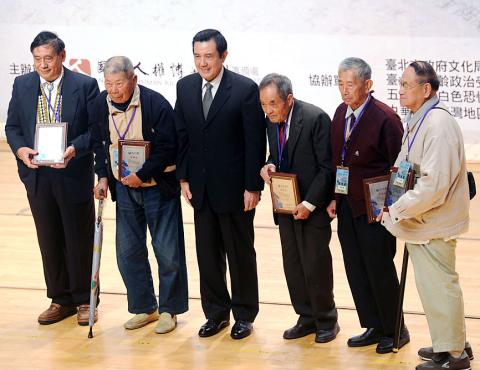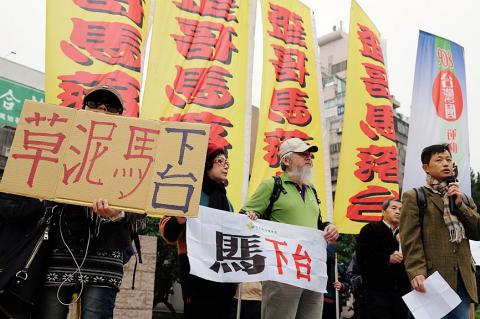The Chinese Nationalist Party (KMT) cannot evade its responsibility for past human rights violations and will face up to the past honestly, President Ma Ying-jeou (馬英九) said yesterday.
Speaking at a memorial concert in Taipei on International Human Rights Day, Ma said whether it is the 228 Incident or the White Terror era, his party must face its mistakes with a reflective attitude.
“Incidents of human rights violations have occurred around the world. They have happened here. The government back then and the government now are the same — the KMT. So we cannot evade that and there is no need to do so,” the president said.

Photo: Sam Yeh / AFP
“Let us face the past honestly and reflect with sincerity to restore the truth and give comfort to the families,” he said.
The 228 Incident refers to the crackdown launched by the then-KMT regime following an incident in Taipei on Feb. 27, 1947. Martial law was imposed later that year and not lifted until 1987. Thousands of people were killed during that era, which became known as the White Terror, and an estimated 140,000 to 200,000 were imprisoned.
Ma presented certificates of appreciation to several political victims and their relatives who contributed to research and education on the atrocities by donating memorabilia to the government.

Photo: Sam Yeh / AFP
The concert was attended by more than 300 White Terror victims and their families, as well as Minister of Culture Lung Ying-tai (龍應台).
Performers and descendants of some of the victims performed songs in memory of those who suffered or lost their lives.
Meanwhile, a group of people who were either involved in the Kaohsiung Incident or its aftermath gathered to commemorate Human Rights Day and expressed concern about the human rights situation in Taiwan.
The Kaohsiung Incident refers a government crackdown on organizers and participants in an anti-government parade in the city on Dec. 10, 1979, organized by Formosa Magazine.
Former vice president Annette Lu (呂秀蓮), one of eight people jailed in the ensuing crackdown, accused Ma of inaction on promoting human rights.
“While history must move forward, some people are trying to take the country back [to the authoritarian era]. What concerns me the most on this day is that most people have either forgotten about or do not yet know about Taiwan’s past struggles,” she said.
Chou Ching-yu (周清玉), wife of former Examination Yuan president Yao Chia-wen (姚嘉文), said that the current administration’s infringement of human rights is astonishing and that Taiwanese have to work together to voice their opposition of the injustice.
“That Taiwan’s human rights development has been backsliding in recent years is undeniable. The Ma administration has not engaged in substantial action despite its boasts about having ratified a pair of international human rights covenants,” Democratic Progressive Party (DPP) Chairman Su Tseng-chang (蘇貞昌) said at a separate event in Pingtung County.
In a Facebook message, former DPP chairperson Tsai Ing-wen (蔡英文) wrote: “What glorifies a country is not its assets, nor the violence it resorts in repressing people. It is its effort to safeguard human rights — the freedoms and equality that every man is entitled to enjoy.”

CHAOS: Iranians took to the streets playing celebratory music after reports of Khamenei’s death on Saturday, while mourners also gathered in Tehran yesterday Iranian Supreme Leader Ayatollah Ali Khamenei was killed in a major attack on Iran launched by Israel and the US, throwing the future of the Islamic republic into doubt and raising the risk of regional instability. Iranian state television and the state-run IRNA news agency announced the 86-year-old’s death early yesterday. US President Donald Trump said it gave Iranians their “greatest chance” to “take back” their country. The announcements came after a joint US and Israeli aerial bombardment that targeted Iranian military and governmental sites. Trump said the “heavy and pinpoint bombing” would continue through the week or as long

TRUST: The KMT said it respected the US’ timing and considerations, and hoped it would continue to honor its commitments to helping Taiwan bolster its defenses and deterrence US President Donald Trump is delaying a multibillion-dollar arms sale to Taiwan to ensure his visit to Beijing is successful, a New York Times report said. The weapons sales package has stalled in the US Department of State, the report said, citing US officials it did not identify. The White House has told agencies not to push forward ahead of Trump’s meeting with Chinese President Xi Jinping (習近平), it said. The two last month held a phone call to discuss trade and geopolitical flashpoints ahead of the summit. Xi raised the Taiwan issue and urged the US to handle arms sales to

State-run CPC Corp, Taiwan (CPC, 台灣中油) yesterday said that it had confirmed on Saturday night with its liquefied natural gas (LNG) and crude oil suppliers that shipments are proceeding as scheduled and that domestic supplies remain unaffected. The CPC yesterday announced the gasoline and diesel prices will rise by NT$0.2 and NT$0.4 per liter, respectively, starting Monday, citing Middle East tensions and blizzards in the eastern United States. CPC also iterated it has been reducing the proportion of crude oil imports from the Middle East and diversifying its supply sources in the past few years in response to geopolitical risks, expanding

OTHER OPTIONS: Given possible US intervention and Taiwanese counterattacks, China might opt to blockade Taiwan or take its outlying islands instead of an all-out invasion A US think tank has urged Taiwan to adopt a “hellscape” strategy that would flood the Taiwan Strait with drones and other uncrewed systems to deter invasion by China. In its report, Hellscape for Taiwan, published on Thursday, the Center for a New American Security said Taipei’s asymmetric defense approach — often described as a “porcupine strategy” — needs to evolve to keep pace with the growing capabilities of the Chinese People’s Liberation Army. The “hellscape” strategy involves saturating the air and waters around Taiwan with thousands of drones and other platforms capable of striking invading forces from multiple domains at once. Long-range